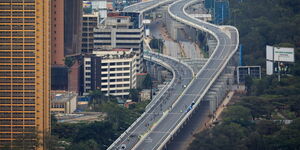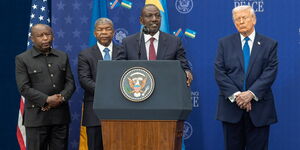The high cost of living tops the list of five issues Kenyans feel the government needs to resolve as a matter of urgency.
This is according to a recent survey by Infotrak, a leading research and consulting company, highlighting Kenyans' top five points of concern regarding President William Ruto's Kenya Kwanza government.
In a survey of 2,400 Kenyans from across the country, 51% of respondents identified the high cost of living as a key area of concern. Unemployment was another recurring issue, with 36% of Kenyans highlighting the lack of jobs as a serious problem in the country.
Corruption was also frequently mentioned, with 24% of respondents singling out graft as a major concern. The top five issues were rounded off by overtaxation and challenges with the new Social Health Authority, both highlighted by 23% of Kenyans.
Other issues mentioned by Kenyans included infrastructure and the overall affordability of healthcare, cited by 13% of respondents.
Affordable education and the cost of doing business were also raised (12%), while at least 9% of respondents expressed concern over extrajudicial killings, which they felt required urgent government attention.
The latest survey comes at a time when President Ruto is facing an uphill task in fending off his critics, most of whom are his political adversaries. While presiding over the Jamhuri Day celebrations, Ruto was adamant most of his critics did not base their criticism on facts.
“I have no problem with discourse, criticism, and alternative proposals. In fact, I welcome them and listen to feedback in order to learn, improve, and become better. However, much of what is presented as fact is falsehood, and much opposition stems from misrepresentation and outright disinformation,” Ruto said on 12 December as he condemned the spread of fake news.
“We are at a stage in social development where digital technologies have immense capacity to amplify disinformation, magnify fake news, and distort facts beyond all recognition. If we give in to these emerging negative trends, we shall pay with our freedom, democracy, and development."
Addressing concerns about Taifa Care, which is replacing the defunct National Health Insurance Fund (NHIF), the President gave an assurance on Monday, 16 December, stating that the government was on course to overcome technological and operational challenges.
"I can see progress; the naysayers are becoming fewer," he said while speaking at the 11th National and County Governments Coordinating Summit held at State House. "Just a few weeks ago, the media claimed that the new healthcare system would not work. Now they acknowledge it is working, although some argue it is creating two categories of Kenyans."
Ruto's biggest challenge at the moment is shifting public perception in his favour, with surveys showing that a majority of Kenyans remain apprehensive about his regime.
According to Infotrak, a significant number of Kenyans lack trust in the electoral agency, believing that the government interferes in the election process.












